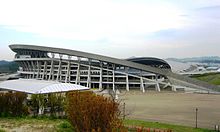This article needs additional citations for verification. (November 2015) |
 | |
 | |
| Full name | Q&A Stadium Miyagi |
|---|---|
| Former names | Miyagi Stadium (2000–2014) Hitomebore Stadium Miyagi (2014–2020) |
| Location | Rifu, Miyagi, Japan |
| Owner | Miyagi Prefecture |
| Capacity | 49,133 |
| Surface | Grass |
| Construction | |
| Broke ground | 1996 |
| Opened | March 2000 |
| Tenants | |
| Vegalta Sendai Mynavi Sendai Ladies Sony Sendai FC Japan National Football Team
| |

Miyagi Stadium (宮城スタジアム, Miyagi Sutajiamu), also known as the Q&A Stadium Miyagi (キューアンドエースタジアムみやぎ, Kyūandoēsutajiamu Miyagi) for sponsorship reasons, is an athletic and football stadium in the town of Rifu in Miyagi Prefecture, Japan. The stadium's capacity is 49,133. The crescent-shaped roof extending past the edge of the stadium is meant to evoke images of Date Masamune, a daimyō of Mutsu Province, which included the present-day Miyagi Prefecture. From 1 April 2014, the stadium was known as the Hitomebore Stadium Miyagi (ひとめぼれスタジアム宮城, Hitomebore Sutajiamu Miyagi), named after the main variety of rice produced in the prefecture, as the naming rights were acquired by the Miyagi Prefecture headquarters of Zen-Noh. The stadium adopted its current name on 1 April 2020 due to a sponsorship agreement with the Q&A Corporation.[1]
Miyagi Stadium hosted three matches in the 2002 World Cup, and also hosted the 56th National Sports Festival of Japan in 2001. It is one of the planned football venues for the 2020 Summer Olympics.[2]
In addition, Miyagi Stadium also hosted six matches at the 2012 FIFA U-20 Women's World Cup and it would become the first stadium (and to date the only stadium) to have hosted matches at both a men's FIFA World Cup and a women's FIFA U-20 World Cup.
Vegalta, Mynavi and Sony Sendai only use here occasionally.
The football field is surrounded by a nine-lane track. A large video screen and scoreboard is installed in the northern end.
- ^ 宮城スタジアム、新愛称は「キューアンドエースタジアムみやぎ」
- ^ "Venue Plan". Tokyo 2020 Bid Committee. Archived from the original on 27 July 2013. Retrieved 11 September 2013.